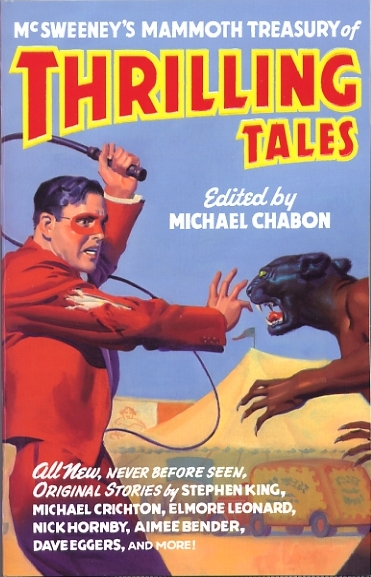 |
|
Who's literary now, eh? |
|
|
|
Hidden Shallows
The Agony Column for April 24, 2003
Commentary by Rick Kleffel
Ooh! Ooh! Lookit this:
 |
|
Who's literary now, eh? |
It's latest issue of the you-can't-touch-me-I'm-heavy McSweeney's, and it's all cheesy speculative fiction. We're literary now. Who's the man? Who's the man?
Michael Chabon, that's who, with a you-can-do-it from Dave Eggers. Illustrated by Howard Chaykin. And yes, ladies and gentlemen, This Is Literature. Don't worry - those are chrome steel vanadium chains! He cannot escape from these chains!
Well, apparently ladies and gentlemen, Speculative fiction has escaped from its chains again. Not surprisingly, it was a big ol' white guy who made the first break. When Stephen King got a story published in the New Yorker, we all knew that the walls were a gonna fall. It was only a matter of time, a thought confirmed when that same story won a prestigious literary award. Stephen King, the self-described "Big Mac" of American Literature writing a literary prizewinning story? What's going on here? More importantly, what embarrassing excess will result in the upcoming ouster? My guess is that the person who imitates the soon-to-be ubiquitous scene from the upcoming 'Matrix' movies by jumping on the hood of a car from a freeway overpass will once again bring out the villagers and their torches.
In the meantime, we'd better smoke 'em while we got 'em. You see, Chabon does a lot more than let in a genre here. Genre fiction has been canonized and un-canonized as often as Susan Lucci has been nominated for a Daytime Emmy award. I'm not just throwing in a spurious soap opera reference. While 'Thrilling Tales' offers up a heaping helping of literati-approved horror, science fiction and fantasy, it also offers up something subtler. We're looking at nothing less than the official canonization of Non-Meaningful Literature. We're looking that the acceptance of fun.
Because that's what this is all about. You need to pay attention to the man behind the curtain. It took a whirlwind descent into worldwide depression, war, and famine to bring it about, but it's once again acceptable for literature to be fun. This is no small concession. This is a paradigm shift with serious economic consequences for the publishing industry. If literature is allowed to be fun there's more hope that it might sell. Can literature be fun? And can speculative fiction that is not necessarily "fun" be literature? Can that sell too? Of course. As ever, you just have to look hard enough. But you also have to start stretching your definitions. The trick is not to do so until they break. Neal Asher told me that his fiction has "hidden shallows". That's exactly what we're looking for.
The problem is to try to distinguish between skills that have artistic merit and skills that have merely commercial merit, and to find the state line where one turns into the other.
The problems with this attitude present themselves quickly. First and foremost that's a really steep and very slippery slope. Not all cheap cheese is good. So those literary readers who are now allowed to enjoy themselves at the behest of Mr. Chabon will have to be careful to pick their poison wisely. Sometimes a crappy novel is just a crappy novel. How to tell the difference between the finest Limburger and rancid American Cheese?
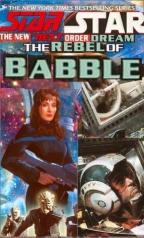 |
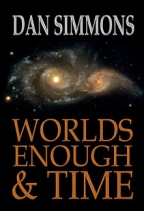 |
|
Chances are that this novel does not have an excess of literary value. |
...While the author alone lets you know that 'Worlds Enough and Time' is literature. |
Fine cheese - or good cheap thrills - are both rather difficult to create, though they may both just look like any other lump sitting there awaiting perusal. And for each reader there's a certain personal aspect that often results in one man's trash being another man's treasure. Still, there are some guidelines. The first thing to look for is someone with an original imagination. That makes it easy to dismiss a lot of crap from the get-go. If it looks like something that's already been done, then you can reliably pass it by. So you can with the wave of a wand dismiss vast realms of cookie-cutter Tolkienesque fantasy and a legion of limp 'Star Wars/Trek' wannabes. Now, if you go back and look at them again, you might find something worth reading. I frankly haven't bothered. There's enough other stuff out there so that you need not bother either unless you read really, really fast.
Here's where the services of Mr. Chabon and others like him come in handy. Once you're picking your cheesy literature, a good anthology can be an invaluable tool for divining who is worth reading and who is not. More importantly, an editor cannot help but have a certain sensibility, and writers associated with that editor are likely candidates for fun.
But all this avoids the key point: what makes for good fun reading? A sense of humor is always a good key indicator. Because, damn, if books make you laugh out loud, there's concrete evidence you're having fun. Those books are doing their job. Moreover, comedy, even so-called "low comedy" is very difficult to write. It requires more skill as an introspective epiphany. Look, writing is something of an introspective epiphany. Writing itself is inherently unfunny - some schmuck sitting at a keyboard typing. No matter how many shots of people typing frantically at keyboards you see in action movies, let me tell you, it's not an action-oriented experience. It's boring to watch. No pratfalls there. The skill of good comedic writing can turn even a fairly heavyweight piece of literature into fun.
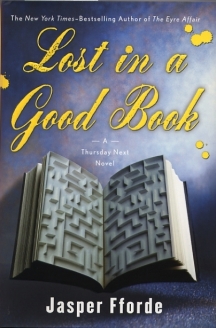 |
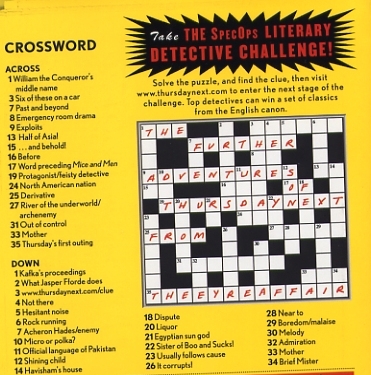 |
|
Jasper Fforde knows how to have fun... |
....and he shows it with clever graphics like this as well as his sparkling prose. |
Take for example Jasper Fforde whose Thursday Next novels ('The Eyre Affair' and 'Lost in a Good Book', now out in the US) combine lots of very arcane literary trivia - the kind that drive down eyelids in high-school classrooms around the nation - and lots of humor to come up with reading that is at once fun and literary. Joe R. Lansdale can be funny, and he wins literary acclaim and prizes for works as diverse as 'The Bottoms' and 'Godzilla's Twelve Step Program'. His Hap & Leonard (including 'Two Bear Mambo' and 'Rumble Tumble' and novels are practically a guaranteed good time. Humor is always a good sign.
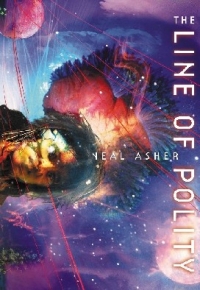 |
|
More fun than a barrel of gabbleducks. |
Humor doesn't have to be obvious and it doesn't always have to engender laughs. An author I consider an exemplary example of good, clean fun is the aforementioned Neal Asher. Here's a man who is plying original waters with a vengeance that is positively gleeful in his three novels 'Gridlinked', 'The Skinner' and 'The Line of Polity'. He's having fun going way, way over the top. In a sense every word that Asher writes has some comedic value, and he's smart enough to know that you're laughing at him, not with him. So he plays it up a bit, aiming for smiles without resorting to jokes.
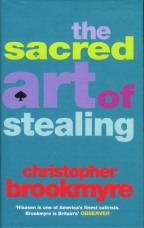 |
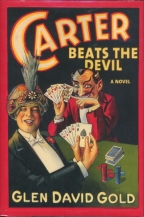 |
|
Read the rant that begins this book and understand the meaning of fun. |
How can you pass up a book with this garish a cover? Well easily, but read the reviews -- both Katie Dean and I enjoyed this book immensely. |
Asher also exemplifies another aspect of good fun reading, which is an unfettered imagination. In Asher's case, his imagination is deployed in a science fictional context, so he's constantly throwing monsters, aliens, and technology at the reader. None of these are the overly-researched mini-lectures of scientist science fiction writers. They're a lot closer to the gadgets that James Bond gets from Q, clever and witty. On the other hand, imagination need not be constrained to science fiction. Christopher Brookmyre can dream up a looney-tunes crime plot like nobody's business. But he does back it up with jokes, lots of them, and good ones. Glen David Gold applies his high imagination to re-creating the world of Charles Carter, a turn of the twentieth century magician in 'Carter Beats the Devil'. You get the idea.
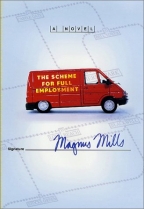 |
|
I always look forward to Magnus Mills entertaining books. |
Fun reading also requires a certain simplicity, an ease-of-reading which again requires a bit more skill to create than might at first be obvious. A good example comes from the carefully crafted novels of Magnus Mills. In 'The Restraint of Beasts', 'Three to See the King' and 'The Scheme for Full Employment', he writes prose that's absolutely clear, simple and to the point. His books are short and easy to read. They're funny, simple and fun. But they're also backlit with fascinating twists of reality and perspectives that are astonishingly original.
One thing that strikes me about quality humor is that it's funny more than once. I can go back and re-read my favorite passages in jasper Fforde, Christopher Brookmyre, Joe R. Lansdale and Magnus Mills again and again and just enjoy the sheer exuberance of their language, the humorous quality of their prose. I mean, there are literary icons who were allowed to be funny - Jonathan Swift and George Orwell canonized and laughable. From 'A Modest Proposal' stems all American satirical humor.
And that's it for fun. Clear prose, a good sense of humor and imagination to excess will pretty much round you up some fun reading that doubles as high quality literature. Bad jokes, stories and characters you've seen a million and breathless bullshit are to be avoided. This is not to say that more challenging literature even to the point of difficult reading cannot be fun. But this time round, I'm talking about good-old 'Thrilling Tales' style stories from all genres and all walks of life. They're it now - the real thing. The redheaded stepchild is now literature.
Thanks,
Rick Kleffel
On a purely administrative note, I'm shooting for a more weekly format, with shorter columns and fewer roundups, a more critical look at stuff. This is the first, I hope to get better and get more. Email me and let me know what you think. You're the readers, you're the clients, I want to tell you what you need to hear. Let me know if I'm on the right track.